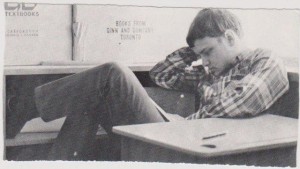(gr. 12 English class, 1967 A.D.: a serious-minded scholar is born with Hamlet: Tothineownselfbetrue.ca was in the stars)
It’s been a long road from there to here. Everyone’s conscious and has feelings from the get-go. Whatever ‘ideas’ are probably truly more like whims or notions in/from childhood to adolescence. Whatever actual ideas that emerge in this time zone tend to be short-lived, incomplete, and not fully formed or understood. And one makes many mistakes acting on these early ‘ideas’; one spends a lot of time being repeatedly confused and unsure. (Some people never get beyond this stage, I suppose, based on the number of domestic terrorists who showed up on January 6, 2021.)
Personally, I recall first playing with ideas as we studied Hamlet in grade 12. That year (1967) I also got up in class and gave my first presentation on John Keats’s “On First Looking into Chapman’s Homer”, so I’d have to think I was capable of thinking through a presentation ahead of time, organizing what I thought and would say to an audience. This was a pattern which then repeated itself through the following university years.
Those scholarly years were also a time of unlimited reading, study, listening, and making more presentations and writing many essays. When you read, you think. When you write, you reveal your thoughts. A full-throttle stage.
When I started teaching in 1972 at the age of 23, thinking became a means of survival and communication necessary for the job. Plus I had to articulate others’ works and ideas for high school students. In my second year, I started theme teaching–which opened up something I had by that point understood from my post-secondary training–that there were, indeed, patterns, once you looked at several similar examples. These patterns and themes revealed there was design embedded in our experiences, and that in talking and writing about these designs, one naturally moved to a higher order of thinking; aided in my situation by the teaching of irony, allegory, symbolism, even just basic conflicts in human experience.
In 1977, another U of A Ed grad student (Glen Kirkland, my co-author of some 23 years) and I realized that this thematic-making sense of things would work with general and non-academic students and lead to greater teaching and learning successes. (The same principle would also work with academic students at a higher, more sophisticated level.) This led to many textbooks and guides, including those with another likewise-minded author-friend (Jerry Wowk) all based on the premise that high-school teachers could teach ideas, themes, and thinking via this approach.
Since the late ’70s, thus, thinking and teaching ideas became the core of my personal pedagogy and life. Every day I wake up and respond to the ideas I encounter in the newspaper, on t.v., and online from mainstream media sources. Every day is a continuing engagement with the world of ideas, and articulating my understandings and responses through my blog and my poetry.
Looking back now, I see how this has been a long, privileged, and lucky journey. If I was to give advice to anyone who wanted to think more and express themselves better in writing, speech, and words, I would say: Read well the writers of the past, read classics, discuss ideas from reading with others, look for patterns, articulate these patterns for yourself and share them with others.
High-school or post-secondary English teaching would be a logical place to develop your thinking and expression skills. Writing out your ideas and public speaking are other opportunities that will take you deeper into ideas and thinking, and understanding human beings, human nature, relationships, politics, and life on many other levels.
If you educate yourself, thus–taking responsibility for your destiny–then you can’t help but grow and develop as a literate, knowledgeable, autonomous, credible, popular, and well-rounded person. Daily understanding and articulation guaranteed. Take my word for it.

